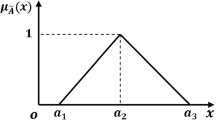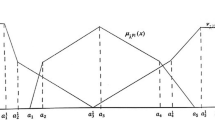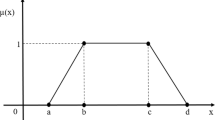Abstract
This article addresses a special class of non-linear programming problems, viz., linear fractional programming problems having multiple objectives. In solving the real-life linear fractional optimization problems, the ambiguity and hesitation in the decision are inherent and ever-present, therefore, it is perfectly viable to formulate and solve these optimization models using the intuitionistic fuzzy environment. The purpose of this study is to propose a simple and computationally efficient approach to obtain the solution of multiple objective linear fractional programming problems having all the decision variables and parameters expressed in terms of triangular intuitionistic fuzzy numbers. The proposed solution algorithm is primarily based on the goal programming approach, fuzzy-based linearization technique, and a membership function strategy. The original linear fractional programming problem is first converted to its equivalent deterministic/crisp multi-objective linear fractional optimization problem using the weighted goal programming methodology along with the linear membership technique to resolve the intuitionistic fuzzy constraints into the crisp one. Finally, the variable transformation technique for the under- and over-deviational variables of the goal programming model is employed to linearize all the fractions involved in the problem so as to convert the original problem to an equivalent linear optimization problem. Further, this linear programming problem can be solved using any available commercial packages. Moreover, a numerical illustration is provided to demonstrate the steps of the proposed technique followed by the analysis and solution of an E-education set-up problem. The discussion and comparisons of the practical case establish the relevancy and usefulness of the proposed model.










Similar content being viewed by others
Explore related subjects
Discover the latest articles, news and stories from top researchers in related subjects.Abbreviations
- LFP:
-
Linear fractional programming
- MOLFP:
-
Multi-objective linear fractional programming
- DM:
-
Decision-maker
- IF:
-
Intuitionistic fuzzy
- IF-LFP:
-
Intuitionistic fuzzy linear fractional programming
- IF-MO-LFP:
-
Intuitionistic fuzzy multi-objective linear fractional programming
- IFN:
-
Intuitionistic fuzzy number
- TIFN:
-
Triangular intuitionistic fuzzy number
- s. t.:
-
Subject to
- ELC:
-
E-learning centre
References
Stancu-Minasian, I.M.: Fractional Programming: Theory, Methods and Applications. Kluwer Academic Publishers, Dordrecht (1997)
Zhu, H., Huang, G.H.: SLFP: a stochastic linear fractional programming approach for sustainable waste management. Waste Manag. 31, 2612–2619 (2011)
Bajalinov, E.B.: Linear-Fractional programming: Theory, Methods, Applications and Software. Kluwer Academic Publishers, Boston (2003)
Charnes, A., Cooper, W.W.: Programming with linear fractional functionals. Naval Res. Logist. Q. 9, 181–186 (1962)
Bitran, G.R., Novaes, A.G.: Linear programming with a fractional objective function. Oper. Res. 21, 22–29 (1973)
Tantawy, S.: An iterative method for solving linear fractional programming (LFP) problem with sensitivity analysis. Math. Comput. Appl. 13, 147–151 (2008)
Tantawy, S.F.: A new concept of duality for linear fractional programming problems. Int. J. Eng. Innov. Technol. 3, 147–149 (2014)
Wu, Z., Gao, Q., Jiang, B., Karimi, H.R.: Solving the production transportation problem via a deterministic annealing neural network method. Appl. Math. Comput. 411, 126518 (2021)
Wu, Z., Karimi, H.R., Dang, C.: An approximation algorithm for graph partitioning via deterministic annealing neural network. Neural Netw. 117, 191–200 (2019)
Luhandjula, M.K.: Fuzzy approaches for multiple objective linear fractional optimization. Fuzzy Sets Syst. 13, 11–23 (1984)
Dutta, D., Rao, J.R., Tiwari, R.N.: Sensitivity analysis in fractional programming-the tolerance approach. Int. J. Syst. Sci. 23, 823–832 (1992)
Chakraborty, M., Gupta, S.: Fuzzy mathematical programming for multi objective linear fractional programming problem. Fuzzy Sets Syst. 125, 335–342 (2002)
Pal, B.B., Moitra, B.N., Maulik, U.: A goal programming procedure for fuzzy multiobjective linear fractional programming problem. Fuzzy Sets Syst. 139, 395–405 (2003)
Guzel, N., Sivri, M.: Taylor series solution of multi objective linear fractional programming problem. Trakya Univ. J. Sci. 6, 91–98 (2005)
Chang, C.-T.: Fuzzy linearization strategy for multiple objective linear fractional programming with binary utility functions. Comput. Ind. Eng. 112, 437–446 (2017)
Bellman, R.E., Zadeh, L.A.: Decision making in a fuzzy environment. Manage. Sci. 17, 141–164 (1970)
Abo-Sinna, M.A., Baky, I.A.: Fuzzy goal programming procedure to bilevel multiobjective linear fractional programming problems. Int. J. Math. Math. Sci. (2010). https://doi.org/10.1155/2010/148975
Li, D., Chen, S.: A fuzzy programming approach to fuzzy linear fractional programming with fuzzy coefficients. J. Fuzzy Math. 4, 829–833 (1996)
Pop, B., Stancu-Minasian, I.M.: A method of solving fully fuzzified linear fractional programming problems. J. Appl. Math. Comput. 27, 227–242 (2008)
Veeramani, C., Sumathi, M.: Solving the linear fractional programming problem in a fuzzy environment: numerical approach. Appl. Math. Model. 40, 6148–6164 (2016)
Ebrahimnejad, A., Ghomi, S.J., Mirhosseini-Alizamini, S.M.: A revisit of numerical approach for solving linear fractional programming problem in a fuzzy environment. Appl. Math. Model. 57, 459–473 (2018)
Arya, R., Singh, P., Bhati, D.: A fuzzy based branch and bound approach for multi-objective linear fractional (MOLF) optimization problems. J. Comput. Sci. 24, 54–64 (2018)
Arya, R., Singh, P., Kumari, S., Obaidat, M.S.: An approach for solving fully fuzzy multi-objective linear fractional optimization problems. Soft. Comput. 24, 9105–9119 (2020)
Luo, Q., Nguyen, A.-T., Fleming, J., Zhang, H.: Unknown input observer based approach for distributed tube-based model predictive control of heterogeneous vehicle platoons. IEEE Trans. Veh. Technol. 70(4), 2930–2944 (2021)
Ju, Z., Zhang, H., Tan, Y.: Distributed Stochastic Model Predictive Control for Heterogeneous Vehicle Platoons Subject to Modeling Uncertainties. IEEE Intell. Transp. Syst. Mag. 14(2), 25–40 (2021)
Singh, S.K., Yadav, S.P.: Scalarizing fuzzy multi-objective linear fractional programming with application. Comput. Appl. Math. 41(3), 1–26 (2022)
Stanojević, B.: Extension principle-based solution approach to full fuzzy multi-objective linear fractional programming. Soft Comput. 12, 1–8 (2022)
Borza, M., Rambely, A.S.: An approach based on α-cuts and max-min technique to linear fractional programming with fuzzy coefficients. Iran. J. Fuzzy Syst. 19(1), 153–168 (2022)
Stanojević, B., Stanojević, M.: Empirical α,β-acceptable optimal values to full fuzzy linear fractional programming problems. Procedia Comput. Sci. 199, 34–39 (2022)
Jayalakshmi, M.: Solving intuitionistic fuzzy linear fractional programming problem. Int. J. Sci. Res. Eng. Stud. 2, 29–32 (2015)
Singh, S.K., Yadav, S.P.: Fuzzy programming approach for solving intuitionistic fuzzy linear fractional programming problem. Int. J. Fuzzy Syst. 18, 263–269 (2016)
Amer, A.H.: An interactive intuitionistic fuzzy non-linear fractional programming problem. Int. J. Appl. Eng. Res. 13, 8116–8125 (2018)
Bharati, S.K.: Trapezoidal intuitionistic fuzzy fractional transportation problem. In: Bansal, J., Das, K., Nagar, A., Deep, K., Ojha, A. (eds.) Soft Computing for Problem Solving: Advances in Intelligent Systems and Computing, pp. 833–842. Springer, Singapore (2019)
Ali, I., Gupta, S., Ahmed, A.: Multi-objective linear fractional inventory problem under intuitionistic fuzzy environment. Int. J. Syst. Assurance Eng. Manag. 10, 173–189 (2019)
El Sayed, M.A., Abo-Sinna, M.A.: A novel approach for fully intuitionistic fuzzy multi-objective fractional transportation problem. Alex. Eng. J. 60, 1447–1463 (2021)
Sahoo, D., Tripathy, A.K., Pati, J.K.: Study on multi-objective linear fractional programming problem involving pentagonal intuitionistic fuzzy number. Results Control Optim. 6, 100091 (2022)
Batamiz, A., Allahdadi, M., Hladík, M.: Obtaining efficient solutions of interval multi-objective linear programming problems. Int. J. Fuzzy Syst. 22(3), 873–890 (2020)
Rizk-Allah, R.M., Abo-Sinna, M.A., Hassanien, A.E.: Intuitionistic fuzzy sets and dynamic programming for multi-objective non-linear programming problems. Int. J. Fuzzy Syst. 23(2), 334–352 (2021)
Khalil, S., Kousar, S., Freen, G., Imran, M.: Multi-objective interval-valued neutrosophic optimization with application. Int. J. Fuzzy Syst. (2021). https://doi.org/10.1007/s40815-021-01192-w
Cheng, P., He, S., Stojanovic, V., Luan, X., Liu, F.: Fuzzy fault detection for Markov jump systems with partly accessible hidden information: an event-triggered approach. IEEE Trans. Cybern. (2021). https://doi.org/10.1109/TCYB.2021.3050209
Ren, C., He, S., Luan, X., Liu, F., Karimi, H.R.: Finite-time L2-gain asynchronous control for continuous-time positive hidden Markov jump systems via T–S fuzzy model approach. IEEE Trans. Cybern. 51(1), 77–87 (2020)
Mohamed, R.H.: The relationship between goal programming and fuzzy programming. Fuzzy Sets Syst. 89, 215–222 (1997)
Charnes, A., Cooper, W.W.: Management Models and Industrial Applications of Linear Programming. Wiley, New York (1961)
Ijiri, Y.: Management Goals and Accounting for Control. North Holland, Amsterdam (1965)
Lee, S.M.: Goal Programming for Decision Analysis. Auerbach Publisher, Philadelphia (1972)
Acknowledgements
The authors are deeply thankful to the Editor and the anonymous referees for their fruitful comments which helped us to improve the overall quality of the manuscript. Moreover, the first author is grateful to the Ministry of Human Resource Development, India, for financial support, to carry out this research work. The second author would like to acknowledge the Uttarakhand State Council for Science and Technology, Dehradun, India to provide financial support to carry out this work under the Project No. UCS &T/R7D-19/20-21/19222/1.
Author information
Authors and Affiliations
Corresponding author
Ethics declarations
Competing Interests
The authors declare that they have no known competing financial interests or personal relationships that could have appeared to influence the work reported in this paper.
Ethical Approval
This article does not contain any studies with human participants or animals performed by any of the authors.
Rights and permissions
About this article
Cite this article
Malik, M., Gupta, S.K. An Application of Fully Intuitionistic Fuzzy Multi-objective Linear Fractional Programming Problem in E-education System. Int. J. Fuzzy Syst. 24, 3544–3563 (2022). https://doi.org/10.1007/s40815-022-01348-2
Received:
Revised:
Accepted:
Published:
Issue Date:
DOI: https://doi.org/10.1007/s40815-022-01348-2




